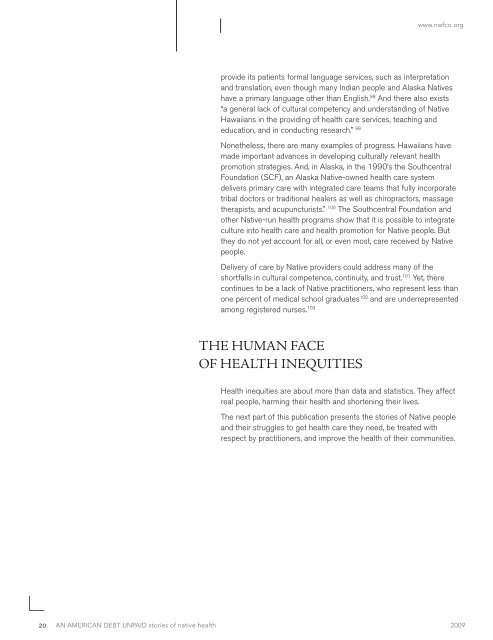An American Debt Unpaid: Stories of Native Health - Alliance for a ...
An American Debt Unpaid: Stories of Native Health - Alliance for a ...
An American Debt Unpaid: Stories of Native Health - Alliance for a ...
Create successful ePaper yourself
Turn your PDF publications into a flip-book with our unique Google optimized e-Paper software.
www.nwfco.orgprovide its patients <strong>for</strong>mal language services, such as interpretationand translation, even though many Indian people and Alaska <strong>Native</strong>shave a primary language other than English. 98 <strong>An</strong>d there also exists“a general lack <strong>of</strong> cultural competency and understanding <strong>of</strong> <strong>Native</strong>Hawaiians in the providing <strong>of</strong> health care services, teaching andeducation, and in conducting research.” 99Nonetheless, there are many examples <strong>of</strong> progress. Hawaiians havemade important advances in developing culturally relevant healthpromotion strategies. <strong>An</strong>d, in Alaska, in the 1990’s the SouthcentralFoundation (SCF), an Alaska <strong>Native</strong>-owned health care systemdelivers primary care with integrated care teams that fully incorporatetribal doctors or traditional healers as well as chiropractors, massagetherapists, and acupuncturists.” 100 The Southcentral Foundation andother <strong>Native</strong>-run health programs show that it is possible to integrateculture into health care and health promotion <strong>for</strong> <strong>Native</strong> people. Butthey do not yet account <strong>for</strong> all, or even most, care received by <strong>Native</strong>people.Delivery <strong>of</strong> care by <strong>Native</strong> providers could address many <strong>of</strong> theshortfalls in cultural competence, continuity, and trust. 101 Yet, therecontinues to be a lack <strong>of</strong> <strong>Native</strong> practitioners, who represent less thanone percent <strong>of</strong> medical school graduates 102 and are underrepresentedamong registered nurses. 103THE HUMAN FACEOF HEALTH INEQUITIES<strong>Health</strong> inequities are about more than data and statistics. They affectreal people, harming their health and shortening their lives.The next part <strong>of</strong> this publication presents the stories <strong>of</strong> <strong>Native</strong> peopleand their struggles to get health care they need, be treated withrespect by practitioners, and improve the health <strong>of</strong> their communities.20 AN AMERICAN DEBT UNPAID stories <strong>of</strong> native health 2009




